Spending hours on the road can be taxing, but figuring out what to eat can feel like even more of a challenge. As a trainer and nutritionist, my clients always have questions about maintaining a healthy weight while they’re on the road and don’t have access to their usual options. Luckily, there are many healthy road trip snacks that will give you energy and require minimal to no prep.
Keep reading to discover 18 of the best healthy road trip snacks that you can bring along on your next adventure, along with essential tips for food prep.
Best healthy road trip snacks that are good for you
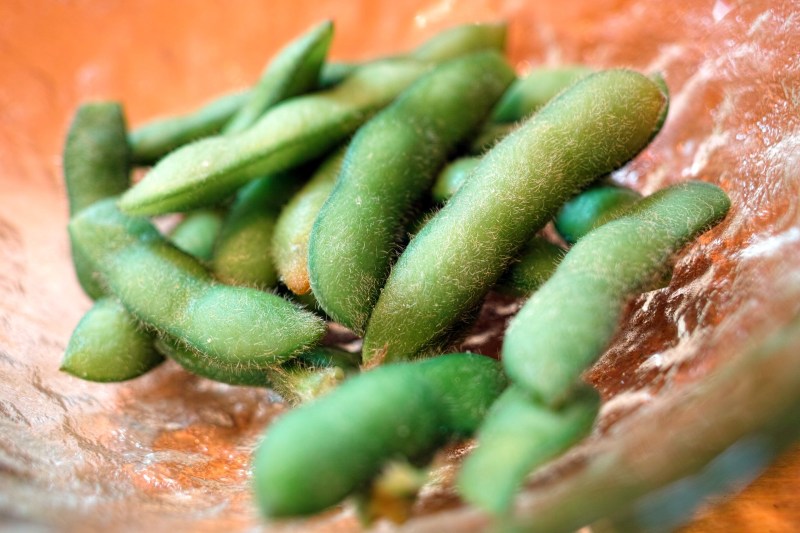
Regardless of whether you’re a planner or prefer to wing it and pull over once hunger strikes, there are plenty of healthy snacks for road trips you can choose from. Keep reading for inspiration to come up with healthy snacks for the road.
Hard-boiled eggs
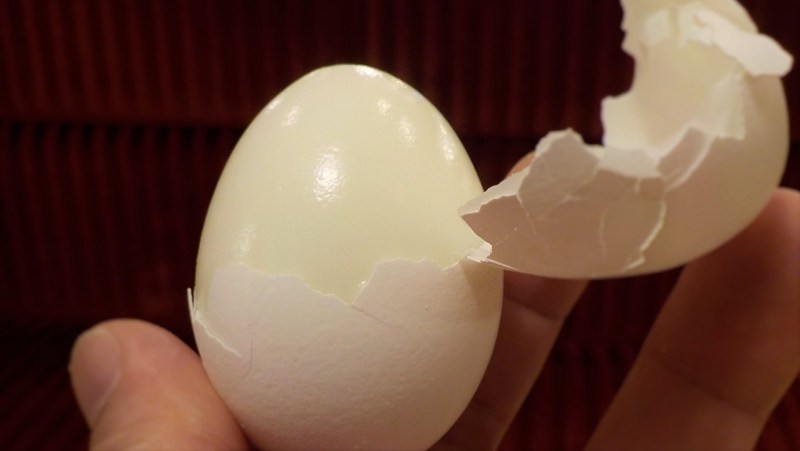
Eggs might as well be considered nature’s perfectly wrapped gift of nutrition. You get a complete source of protein with all the essential amino acids your body needs, as well as iron, B vitamins, and vitamins A, K, and D. You can sometimes find them in the refrigerated section of a rest stop shop or cook up several before you leave home and pack them in a cooler.
Edamame
Edamame is a staple in Japanese diets, but we’d do well to follow suit with this mighty little soybean. It’s rich in protein, filling fiber, antioxidants, vitamin K, iron, and calcium. Edamame is also filling and travels well. You can usually buy it in the pods or shelled, and you may be found frozen at your local grocery store. You can even use it as the “ice pack” in your cooler in lieu of ice to keep your other snacks chilled on the road. Then, as the miles pass by and your edamame thaws, you have a refreshing snack.
Low-sodium, organic jerky
Slim Jim’s jerky sticks may be one of the most classic gas station finds for road trip eats. However, as most of us know, they are far from healthy. Packed with sodium, preservatives, artificial colors, and chemicals, this type of jerky is the epitome of processed food.
On the other hand, there are plenty of healthy jerkies on the market these days, many of which are actually available at rest areas and certainly most major grocery stores. These options, such as Krave and Perky Jerky, contain far fewer ingredients, less sugar and sodium, organic meats, and no fillers or dyes. You’ll get a travel-friendly protein punch without all the junk.
Fruit
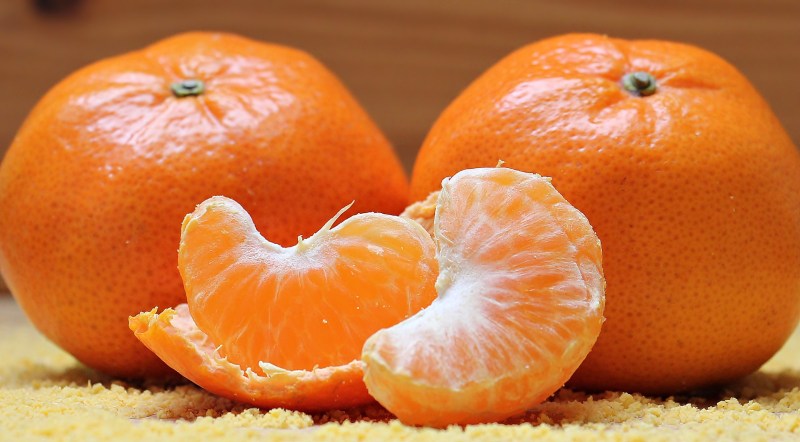
We all know that fruit provides fiber, vitamins, antioxidants, and water, making for a healthy snack. However, not all fruit travels well, so here’s an instance where you want to choose fruit wisely. Harder fruits like apples and pears tend to stay firm and make good travel snacks. Clementines, tangerines, and oranges are also great options if you have a road companion to help you peel if you’re behind the wheel.
As a bonus perk, they make the car smell fresh. Other good options are cherries, cut melon in containers, and grapes if you have a hard cooler to protect them. You can also go for dried fruit, but keep in mind that the sugar and calories are much more concentrated once the water is extracted, so pre-portion your favorite dried fruits in individual bags.
Trail mix
You can buy or make your own trail mix. Add seeds, roasted or raw nuts, dried fruit, and even some cereal if you want, and you’ll have yourself a snack packed with essential fatty acids and antioxidants that reduce inflammation, increase cell turnover, improve the health of your skin, and keep hunger at bay.
If you’re buying a pre-made mix, look for a low-sodium option, preferably without added sugars. Enjoy Life makes a healthy, allergy-friendly line of flavors. Keep in mind that trail mix is energy-dense, so if you’re watching your calorie intake, measure out the portion sizes — they are surprisingly small!
Protein bars
Not all protein bars are healthy. In fact, some are barely more than a glorified candy bar masquerading as a fitness guru’s training adjunct. Many contain hydrogenated oils, sugars and sugar alcohols, chemicals and fillers, and genetically modified ingredients. However, if you choose wisely, a protein bar can be a nutritious road trip snack, packed with filling protein, vitamins, minerals, potassium, fat, and some fiber.
Opt for ones with fewer than 10 ingredients, preferably whole ingredients like nuts, dried fruit, and seasonings. Kind Bars, RXBar, Orgain, and Zing bars are great options. If you’re looking for something more savory, check out Epic bars, which are sort of a jerky-protein bar hybrid.
Healthy cereal
Even sweetened cereals are healthier than a lot of the typical road trip fare, but if you’re really looking for healthy road trip snacks, opt for nutritious cereals that are low in added sugar, high in fiber and protein, and made with wholesome ingredients. Consider Barbara’s Puffins, Three Wishes cereals, Food For Life Ezekiel cereals, and Mom’s Best cereals. You’ll get a filling snack packed with whole grains without excessive sugars.
Snap peas
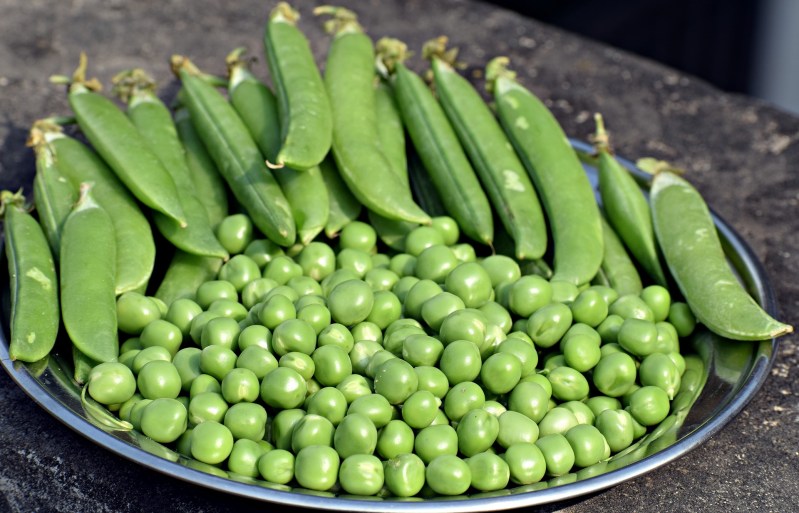
Snap peas don’t pack quite as much protein as edamame, but they are still a good source of fiber and contain vitamins C, K, and A. They are rich in several minerals, such as iron, magnesium, and potassium. Because they are naturally sweet and crunchy, they can give you a nice sensory snack fix without filling your body with processed sugars.
Hummus and veggies or seed-based crackers
Hummus is a smart snack option because it contains protein, fiber, and just enough healthy fat to be as satiating as it is tasty. Pair it with baby carrots, celery, cucumber sticks, or broccoli florets for a low-calorie, filling, nutrient-packed snack. You can also go the more traditional pita route or pick up a box of organic, seed-based crackers like Mary’s Gone Crackers for a more energy-packed snack.
Popcorn
Air-popped popcorn is a low-calorie, healthy snack, but it will give you that satisfying crunch we often crave after many hours of staring at the scenery blur by on the road. Because the calorie density is low — only about 30 calories per cup — you can also munch away on quite a big bag without inhaling hundreds of calories as you might with chips, nuts, or crackers. Popcorn also provides a little bit of fiber (about as much as an apple in a 3-cup serving), and polyphenols, which are antioxidants that combat free radicals in your body.
If you have an air popper, you can pop a bunch at home before you go. Sprinkle it with a little sea salt, Parmesan cheese, nutritional yeast, or cinnamon, then let it cool before pouring it into large Ziploc bags. If you don’t have an air popper, you can prepare it on the stove or look for healthier, pre-popper store-bought options like Skinny Pop or Boom Chicka Pop.
Broccoli florets, baby carrots, and chopped vegetables
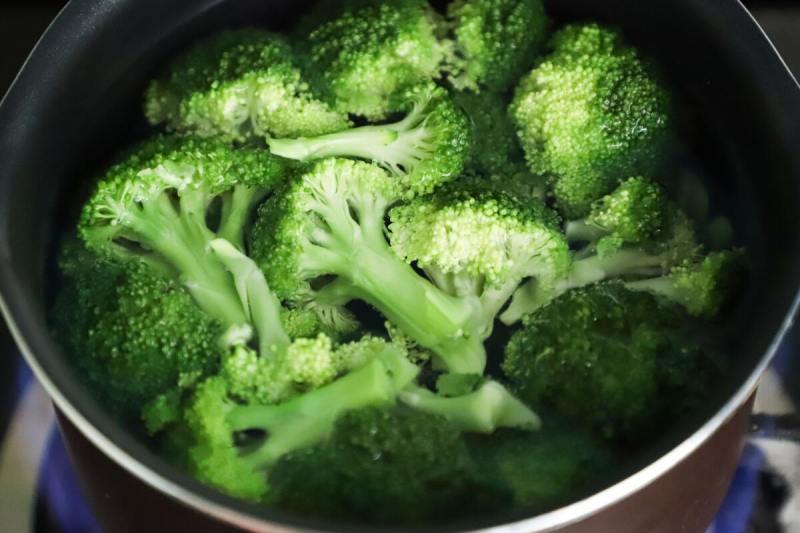
You can’t get much healthier than chopped vegetables. You can either pick them up pre-cut in the prepared section of the grocery store or save money and cut them up at home before hitting the road. Try broccoli and cauliflower florets, baby carrots, cucumber sticks, cherry tomatoes, pepper strips, and summer squash. You can buy single-serve hummus or bring a small container of organic salad dressing for dipping if you want to jazz them up.
String cheese or cheese snacks
String cheese or wax-wrapped cheese, like Babybel cheese, travels very well. They can be thrown in a cooler and stay fresh; plus, unlike many fruits or softer snacks, they tend to stay firm and keep their shape, so you won’t have any majorly misshapen, unappealing blobs on your hand. Most string cheeses are relatively low fat, protein-packed for lasting energy, and provide the bone-building calcium found in many dairy products.
Veggie- and protein-packed wraps
You can make or buy a healthy wrap, which will travel better than more conventional sandwiches. Choose your favorite protein — tuna, turkey, chicken strips, hummus, tempeh — and then load up your wrap with veggies like spinach, carrots, sprouts, and avocado. Even if you’re the one behind the wheel, you can usually eat a wrap fairly easily with one hand.
Nut butter
The healthy fats and protein in nut butters make them very satiating. You can buy individual packets or bring along your favorite jar. Pair it with apple slices, carrot sticks, celery, rice cakes, or your favorite cracker.
No-bake protein bites
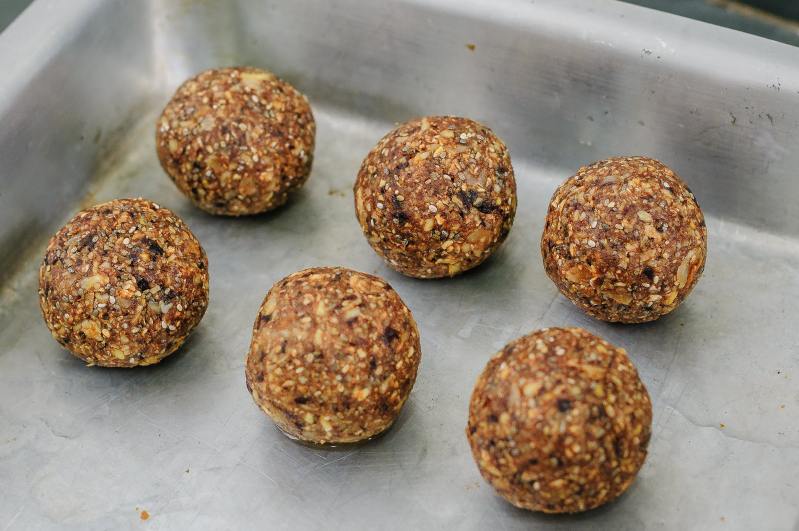
It’s really easy to throw together your own no-bake protein bites at home, and they travel really well. They make a great substitute for sweet snacks like cookies and sugar-laden, conventional granola bars. Plus, you can personalize your
For an easy base to start with, combine whole rolled oats, your favorite nut butter, shredded unsweetened coconut, chopped nuts, dried fruit, and protein powder. Roll the mix into small balls and then coat them in more coconut, cinnamon sugar, or a sprinkle of sea salt. You can add chocolate chips to sweeten them up. If you’re not the DIY type of guy, there are usually pre-made options in organic grocery stores, too.
Low-sodium tuna pouches
You’ll be hard-pressed to find a better protein-to-calorie ratio than light tuna fish packed in water. These days, more companies are making single-serve to-go pouches to help you get your protein fix without the need for a can opener and a kitchen counter.
Some companies jazz up their options with zesty flavors, but be sure to look over the nutrition facts because some of these contain unhealthy additives, excessive sodium, and processed oils. Wild Planet makes a no-sodium pouch with sustainable, wild-caught tuna, which is a premium product when it comes to nutrition, and they carry several other healthy flavored choices.
Greek yogurt or cottage cheese

Greek yogurt and cottage cheese give you a hefty dose of protein to keep you full while you’re on the road. They also have calcium and vitamin D. If you choose a yogurt with live, active cultures, you’ll also get a hefty dose of gut-supportive probiotics to support your digestive and immune systems. In fact, Harvard Health shared that “Daily yogurt intake may also protect against heart disease and type 2 diabetes. Two meta-analyses of prospective cohort studies found an 18% and 14% lower risk of developing type 2 diabetes with daily yogurt intake.”
Throw single-serve cups in a cooler, or you may be able to grab a cup at the next rest stop. If possible, opt for plain, unsweetened options and add your own fruit or chopped nuts if you want. Flavored options often contain syrups, refined sugars, and unnecessary additives.
Roasted chickpeas
You can get most of the same health benefits of hummus in an arguably more fun form with roasted chickpeas. These crunchy, light balls of goodness can satisfy your salty cravings (or sweet, if you find the dessert-inspired flavors) while providing protein, fiber, and micronutrients. Most store-bought options, like The Good Bean, use wholesome ingredients and go easy on the salt, oil, and sugar, too. Or, roast some at home for an even cleaner treat.
How to create a snack tote for your road trip
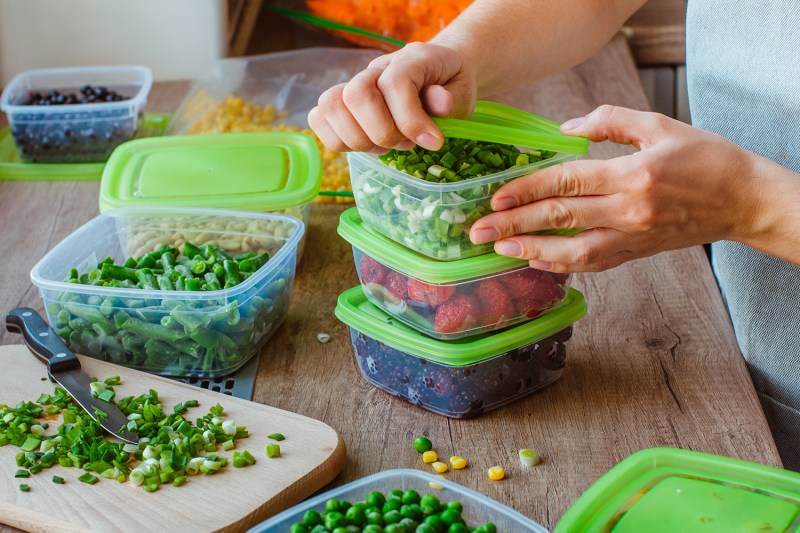
Creating a fantastic snack tote for your road trip can fuel your adventure and keep hunger at bay. Here are some steps to craft the perfect portable pantry:
Gather your supplies
- Tote bag: Choose a spacious and insulated tote bag to keep your snacks fresh and cool. Consider options with compartments, pockets, or a removable liner for organization.
- Cooler packs: Invest in reusable ice packs or gel packs to keep perishable items chilled.
- Containers: Use airtight containers, reusable bags, or bento boxes to portion out snacks and prevent spillage.
- Utensils: Pack reusable forks, spoons, and napkins for a more sustainable and convenient experience.
- Napkins and paper towels: These come in handy for spills and unexpected messes.
Pack strategically
- Place cold items at the bottom with ice packs.
- Group snacks based on their needs. Keep dry snacks together and separate them from fruits and vegetables.
- Use compartments and pockets. Assign pockets for utensils, napkins, and quick-access snacks.
- Leave some space for impromptu finds. You might snag some fresh produce or local treats during your trip.
Bonus tips
- Label your containers: This helps identify what’s inside and prevent confusion.
- Freeze some fruits and vegetables: They’ll act as natural ice packs while thawing and provide a refreshing, hydrating snack.
- Clean and restock after each stop: This ensures hygiene and keeps your snacks fresh for the entire journey.
By following these steps and using your creativity, you can create a fantastic snack tote that will fuel your road trip adventures and keep everyone happy, healthy, and satisfied.
Frequently asked questions

What is the healthiest fast food?
The healthiest fast food options prioritize lean protein, fiber, and healthy fats while keeping added sugars and refined carbs to a minimum. Grilled chicken sandwiches, high-protein salads, and burrito bowls with brown rice, beans, and vegetables are a few examples of great choices. You also want to opt for water instead of sugary
How do you eat healthy while truck driving?
Truck drivers can eat healthy by planning meals and choosing nutrient-dense foods. Pack high-protein snacks like nuts, Greek yogurt, and hard-boiled eggs. At truck stops, choose grilled protein, salads, or veggie-packed wraps. Stay hydrated with water instead of soda, and bring a small cooler for fresh fruits and lean meats. Do meal prepping before your drives to help you avoid fast food and to keep you feeling energized and to support your overall health.




